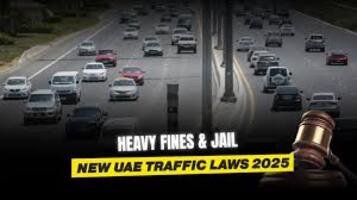This introduction contemplates why having knowledge of UAE traffic rules is not negotiable.
Driving in the UAE is quite a privilege, but driving through the hustle and bustle of Dubai’s Sheikh Zayed Road or Abu Dhabi’s almost physically-irresistible Corniche is definitely a grave responsibility. The Netherlands boasts world-class highways where the fast cars give a sweep just outside the window, whereas in this country it becomes equally important to be disciplined, aware of one’s surroundings, and obey traffic laws.
But many-a-time is it that the majority of drivers, especially the newcomers, unwittingly infringe traffic rules that make them liable to pay huge fines and earn black points or not-so-good influences, which eventually could lead to grave accidents. Whether a resident, a tourist, or a new expat just receiving his UAE Emirates ID, this guide will, therefore, take you through everything you need to know about the UAE traffic rules.
Consider the ins – and the forgive – the outs: For no excuse is valid on UAE roads.
Driving culture in the UAE – the glance
Before we unfold the technical terms, let us sink into what driving feels like. Picture this: Ten lanes on the road with Lamborghinis on one side and the delivery bike on the other. This sounds enticing. It is; just when you obey the rules.
Strict, well-defined traffic laws have been established by the government to preserve order in this anarchy.
And they are serious about them.
Every error has repercussions, from unlawful parking to tailgating. The UAE government is striving for a culture of safety rather than merely seeking compliance.
Smart Cameras and Advanced Traffic Monitoring
Smart cameras and artificial intelligence catch individuals violating the law. They do much more than only look for speeding, however. These systems can identify:
- Drivers not stopping for people at pedestrian crossings
- Cars that overtake when they are not intended to
- Drivers that jump the queue at road exits
- Individuals utilizing their phones while driving.
- These intelligent systems keep roadways safer for all.
Important traffic regulations all drivers must know by 2025
Let us go over the main regulations you have to abide by. Some of these have been recently updated, so even longtime residents may find a few surprises.
1.Stick to the Signs; they establish Speed Limits.
Urban Roads: 60–80 km/h
Highways: 100–120 km/h; some permit up to 140 km/h
Residential Areas: As little as 25–40 km/h
Some Emirates (such as Abu Dhabi) previously had a 20 km/h speed buffer above the posted limit; as of 2024, this buffer is being lifted across numerous regions. Always base your decisions on the sign’s contents.
Fine for Over speeding: AED 300 to AED 3,000
Black Points: Up to 23 points; your car could be seized.
Real-world tip: Waze or Google Maps can usually alert you when you’re about to overspeed.
2. No Mobile Phone While Driving
You may be fined even for tapping your phone as the car is in motion.
Fine: AED 800
Black Points: 4
Good mounts and Bluetooth systems will work. Simply avoid TikTok scrolling while stuck in traffic; you would be astonished at the frequency of this occurrence.
3. Obey Traffic Lights—No Exceptions:
It is about saving life rather than just about getting caught.
Fine: AED 1,000
Black Points: 12
Vehicle seizure: up to 30 days
Abu Dhabi fines of AED 50,000 could result for running a red light should it lead to a serious accident.
4. Driving Without a License? Don’t even consider it.
Driving without a current license is against the law whether you are waiting on your residency or just mislaid your wallet.
Good: AED 5,000
Potential Jail Time: Yes
Vehicle confiscation: likely
Expatriates Note: Only if your home country’s license is authorized and you have a visitor visa can you drive. Residents need to obtain a UAE driving license or convert one.
5:Tailgating and Dangerous Overtaking
We know—some people are rushing.
Fine: AED 400
Black Points: 4
You could also get penalized for fast driving or lane-wrong passing.
6. Respect Pedestrian Crossings
Not only is it disrespectful, but also it is against the law and hazardous not to give way to pedestrians.
Good: AED 500
Black points: 6
UAE is accelerating its road safety program “Vision Zero.” That comprises better crossing enforcement and additional pedestrian sensors.
7. Illegal Parking
All come with consequences: blocking driveways, parking in places designated for those of determination, or stopping on yellow lines.
Fines Range: AED 200–1,000
Black Points: Changes with offense.
Storytime: One friend parked at a disabled parking area in Downtown Dubai “just for five minutes.” That “quick stop” caused him embarrassment and 1,000 AED.
What has changed in fresh 2025 upgrades?
Smart Radar and Artificial Intelligence
Dubai and Abu Dhabi now have AI-powered radars that detect mobile use, lack of seatbelts, lane breaches, etc., all without human involvement.
Rule for All Passengers on Seatbelts: H3
Seatbelts are required for everyone, backseat passengers included, beginning in 2024.
Fine: AED 400 per person not donning one
Black Points: 4 for the driver
Guidelines for Parents and Families on Traffic
Children’s Safety Seats Must Be Required
Kids under four years should sit in an approved car seat.
Fine: AED 400
Black Points: 4
Front seat access is denied for youngsters under 145 cm or less than 10 years.
Expatriate and tourist traffic advice
Renting a car?
Check RTA’s list to see if your home country license is current in the UAE.
If appropriate, take foreign driving permits.
Before you drive off, always check your rental car for dents or scratches and report them.
Driving Etiquette:
Keep right unless overtaking.
Use indicators frequently; people here really look for them.
In the fast lane, flashing headlights mean “Please move aside,” not anger.
Explication of Penalties, Fines, and Black Points System
The UAE employs a black point system whereby drivers get points for infractions. Obtaining 24 points might result in license suspension.
| Offense | Fine (AED) | Black Points |
| Over speeding (severe) | 3,000 | 23 |
| Running red light | 1,000 | 12 |
| Tailgating | 400 | 4 |
| Using phone while driving | 800 | 4 |
| Not wearing seatbelt | 400 | 4 |
Benefits and drawbacks of the rigorous traffic rules in the UAE
✅ Pros:
- Seriously save lives.
- Maintains a steady traffic flow.
- Decreases road rage events.
- Uses technology to support intelligent law.
Cons:
- Heavy fines are expensive.
- Emirates have somewhat different regulations.
- Certain locations contain perplexing signage.
Common Driver Mistakes (And How to Prevent Them)
Ignoring lane discipline Always remain in your lane except if you are passing.
Assuming it’s all right to park “just for 2 minutes” – it’s not.
Not updating Salik or registration information: Particularly following the acquisition of a used automobile.
In conclusion: Drive safe, drive intelligent
Driving in the UAE is a contemporary, opulent experience—but it comes with responsibility. You are safeguarding lives by knowing and obeying traffic regulations; you are not merely avoiding penalties.
Remember: Safety is not discretionary whether you are driving down the palm-fringed streets of Ras Al Khaimah or negotiating Sharjah’s more congested traffic lanes. It’s a lifestyle here.
Practical Lesson:
✅ Respect all posted speed limitations and signs.
Always have your Emirates ID and a valid driving license.
Before passing over your automobile keys, instruct relatives and visitors.









